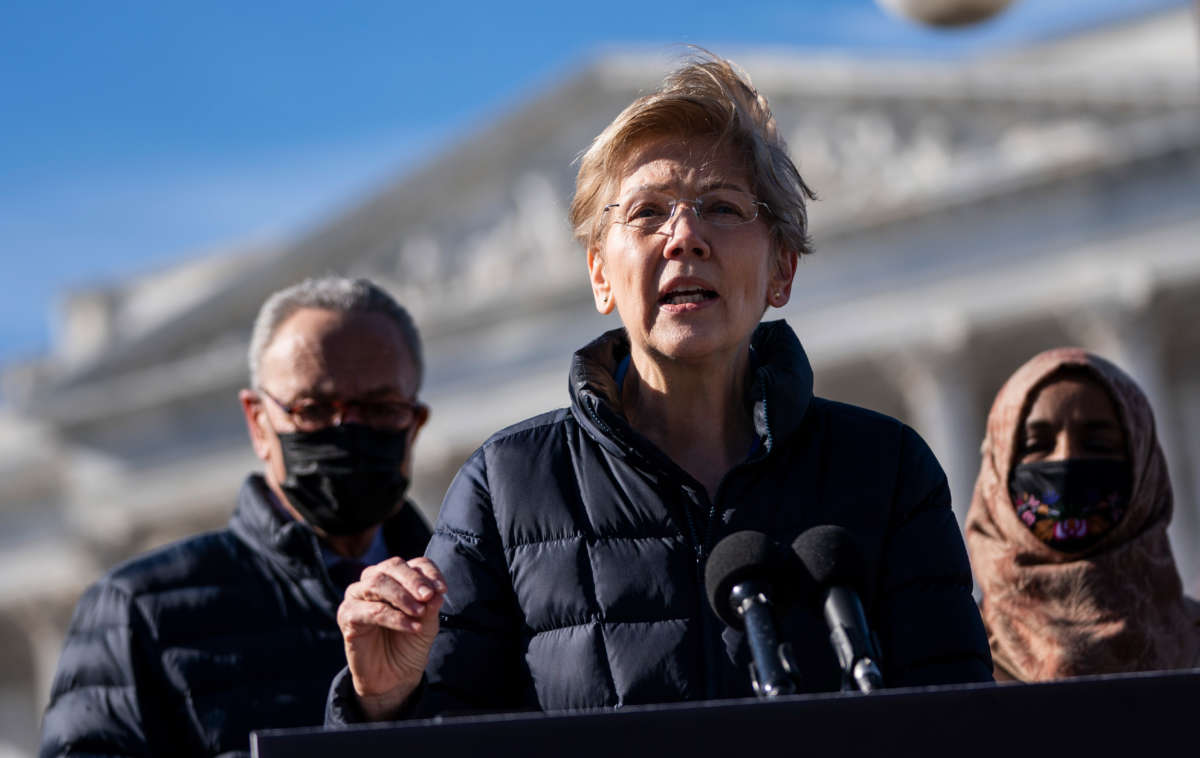Did you know that Truthout is a nonprofit and independently funded by readers like you? If you value what we do, please support our work with a donation.
If student loan payments are allowed to resume without mass debt cancellation, borrowers will lose out on billions of dollars monthly, according to a new report done on behalf of Senate Majority Leader Chuck Schumer (D-New York) and Sen. Elizabeth Warren (D-Massachusetts).
The Roosevelt Institute analysis finds that while the payment pause has helped borrowers save money and even accrue interest, it will cost them over $7 billion a month if payments resume in February. This translates to $85 billion annually.
Restarting payments will especially impact Black and Latinx people, who hold disproportionate amounts of student loans and who struggle to repay those loans at higher rates. Another recent Roosevelt Institute analysis found that canceling up to $50,000 of student debt per borrower would increase Black Americans’ wealth by 40 percent.
Canceling student debt could have wide-ranging positive effects for the economy, adding over $173 billion to the nation’s Gross Domestic Product in the first year alone.
Warren, Schumer and Rep. Ayanna Pressley (D-Massachusetts) cited the report to renew their call for President Joe Biden to extend the payment pause and cancel up to $50,000 of student debt. On Wednesday, the lawmakers sent a letter to the White House saying that they want to present “alarming new information” on the loan repayment resumption.
“In order to prevent the student debt crisis from dragging down on our economic recovery, undermining the effectiveness of the American Rescue Plan, and causing unnecessary pain and stress for American families, we strongly urge you to extend the pause on student loan payments and interest and act to cancel student debt,” the lawmakers wrote.
The Roosevelt Institute also urged Biden to take action on student loans in their report, saying that “the Biden administration should take the lessons learned from the student loan payment pause and implement a full cancellation of student debt via executive order.”
Because the economy is still unstable for many lower- and middle-income Americans, resuming student loan payments could result in major financial disruption for borrowers. A recent survey of over 33,700 people by the Student Debt Crisis Center found that 89 percent of borrowers were not financially secure enough to resume student loan payments, which averaged nearly $400 a month before the pandemic.
These payments present a significant financial burden to borrowers. Over a quarter of respondents said that a third of their income or more will go toward payments, while a tenth of respondents said that payments will cost at least half of their income.
Lawmakers have said that the pandemic is still affecting the economy — and they’ve also argued that the emergence of the Omicron variant of COVID-19 is reason enough to extend the pandemic repayment pause. Researchers are still studying the new variant, but officials say it may require an additional booster dose of COVID vaccines.
This latest letter is the continuation of more than a dozen efforts by Warren and other lawmakers this year to urge Biden to take action on student loans. On the campaign trail, Biden promised to cancel up to $10,000 of student debt per borrower.
Biden hasn’t just failed to cancel student debt; his administration has also lied about the existence of an Education Department memo on the subject. Earlier this year, Biden’s Chief of Staff Ron Klain said that the Education Department would be examining the issue and releasing their opinion on whether or not Biden has the authority to cancel student debt.
That memo was never released, and for months, the administration has said that they don’t have any information on its contents. The memo’s existence was only made public through a Freedom of Information Act filed by debt activists — and it was dated April 8, meaning that the administration has had the memo for months and kept it secret from the public.
So far, the Biden administration’s only step toward student loan relief has been to extend the student loan repayment pause until the end of January next year. With less than two months until payments are scheduled to begin again, and with the administration’s relative weakness on other pandemic protections like the eviction moratorium, it’s unclear whether Biden is planning to take action.
Trump is silencing political dissent. We appeal for your support.
Progressive nonprofits are the latest target caught in Trump’s crosshairs. With the aim of eliminating political opposition, Trump and his sycophants are working to curb government funding, constrain private foundations, and even cut tax-exempt status from organizations he dislikes.
We’re concerned, because Truthout is not immune to such bad-faith attacks.
We can only resist Trump’s attacks by cultivating a strong base of support. The right-wing mediasphere is funded comfortably by billionaire owners and venture capitalist philanthropists. At Truthout, we have you.
Our fundraising campaign is over, but we fell a bit short and still need your help. Please take a meaningful action in the fight against authoritarianism: make a one-time or monthly donation to Truthout. If you have the means, please dig deep.
